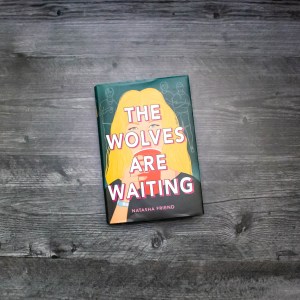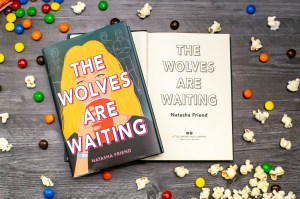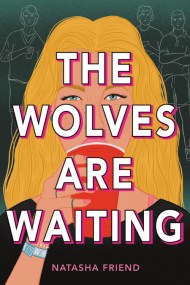1 Author, 7 Questions: Natasha Friend
The Wolves Are Waiting by Natasha Friend is an incredible portrayal of how one girl’s sexual assault changes everyone around her – and how finding her voice can help change her whole community. It feels like Speak for a new generation. But instead of just following Nora and her harrowing journey, we get a glimpse at the people around her – from her best friend, her brother, and her parents – and how their actions can help affect healing. We got to chat with Natasha Friend about The Wolves Are Waiting, the inspiration behind the book and some of the deeper themes within!
What was your initial inspiration for The Wolves Are Waiting?

Like my protagonist, Nora Melchionda, I grew up in a small college town in upstate New York. Like Nora, I spent much of my youth on campus, cheering for the male athletesat their basketball, hockey, and football games—worshipping them from afar. The idea for Wolves came from the three Division-I football players I met the summer I was fifteen. For decades, I had forgotten about them. It wasn’t until the #MeToo movement began gaining traction that I suddenly remembered—how the three of them had flirtedwith me and made me feel special. How we had hung out together on the playground of my elementary school, at New York Pizzeria, in their dorm room. At the end of the summer, my family was moving to Massachusetts, so I said my goodbyes. A few weeks after I moved, I got a phone call from one of my oldest childhood friends. “You know those college guys you hung out with all summer?” she said. “They just gang raped a girl at a frat party.” The shock of hearing those words didn’t resonate then. It didn’t resonate for thirty years. I was in their dorm room, alone. That girl could have been me. Only after I had become a mother did I decide to create a character like my fifteen-year-old self—trusting, innocent, clueless. Nora Melchionda is an ordinary girl who finds herself in an extraordinary situation, waking up on the college golf course with no memory of how she got there, until her friends begin peeling back the layers of her night, revealing some unexpected and disturbing truths.
You do a really excellent job of portraying not just Nora’s feelings, but the feelings of those surrounding her after her sexual assault. What was it like trying to capture those different emotions and perspectives?
I wrote my first six books in the first person. Then I discovered author Jodi Picoult and her shifting third-person POV, and I began to experiment with my own writing. Telling Nora’s story from multiple perspectives allowed me to explore the complex reactions and emotions surrounding sexual assault. Nora wants to pretend the night never happened. Adam wants to protect her. Cam wants to exact revenge. Asher wants to deny he played a role in the attack on his sister. Every response is unique and specific to each character, however flawed. Cam, for instance, misses the mark by pressuring Nora to “do something” or risk being responsible for the next sexual assault, rather than supporting Nora’s preference to heal in silence. Hopefully, by presenting multiple perspectives on Nora’s assault, Wolves will fuel some interesting discussion for readers—not only about how to combat toxic masculinity and rape culture, but also about how to support survivors.
Did you have any inspiration behind the characters of Asher and Adam? Did you plan on each of the male characters having such different reactions to Nora’s situation, or did they emerge in the writing process?
Asher is loosely based on my older brother, Nick, who grew up an artsy, offbeat kid in a town full of athletes. Adam Xu is 100% fictional. I did not pre-determine how either Asher or Adam would respond to Nora’s assault, but as the story unfolded I knew that both boys would come to have a level of self-awareness about their own misogyny that would serve as a foil for the lack of awareness demonstrated by the other male characters in the book.

Nora’s relationship with her mom is particularly compelling, especially as different secrets are revealed. What was it like forging that relationship?
As a mom to three teenagers, I am tempted to share my adolescent cautionary tales with them, but I am also aware of how delicate the balancing act is for parents. How much should we reveal to our kids about our own mistakes in the hopes of protecting them? How much should we let them discover on their own? Presenting Diane Melchionda as flawless at the beginning of the book allows for Nora’s inevitable disillusionment when she discovers her mom is anything but. I wanted Diane’s fall from grace to jumpstart an entirely new connection with her daughter—one based on both vulnerability and strength.
This book is, in a word, cathartic. It has moments of abject horror but also blazing hope. What were the scenes you found most difficult or meaningful to write? What were your favorite sections to write?
The hardest, most emotional sections for me to write were the ones where Nora confronts her dad—first on the football field and then at the Delormes’ house when she shows up on the front stoop and lets him hear her anger for the first time. My favorite part to write was the basketball scene when Rhett materializes with the tiki torches, attempting to redeem himself, and none of his family will cross the picket line. Wherever I can, I love to inject an emotionally powerful scene with sparks of humor and absurdity.
What are some books you’ve been reading recently or would recommend?
I recommend all the books I read while writing Wolves: Know My Name by Chanel Miller; Three Women by Lisa Taddeo; Notes on a Silencing by Lacy Crawford; She Said by Jodi Cantor and Megan Twohey. Unrelated to Wolves, the most recent book I read and enjoyed was Finding Freedom by Erin French, the cook/owner of the Lost Kitchen in Freedom, Maine.
What are you working on now? Any exciting ideas you can share?
I keep all of my book ideas under wraps until I have finished writing. I do have a new plot kicking around in my head right now, but I haven’t put anything on paper yet. I have written about so many heavy topics in the past, and I think the world could do with a little light. Whatever I write next will be full of hope.
The Wolves Are Waiting
by Natasha Friend
From award-winning author Natasha Friend comes a compelling investigation of sexual harassment and the toxic and complicit structures of a small college town.
Before the night of the Frat Fair, 15-year-old Nora Melchionda’s life could have been a Gen-Z John Hughes movie. She had a kind-of boyfriend, a spot on the field hockey team, good grades, and a circle of close friends. Of course there were bumps in the road: she and her lifelong BFF Cam were growing apart and her mother was trying to clone her into wearing sensible khakis instead of showy short skirts. But none of that mattered, because Nora always had her dad, Rhett Melchionda, on her side. Rhett was not only Nora’s hero, but as the Athletic Director of Faber College, he was idolized by everyone she knew.
Now, Nora would give anything to go back to that life. The life before whatever happened on the golf course.
She doesn’t want to talk about it—not that she could, because she doesn’t remember anything—and insists that whatever happened was nothing. Cam, though, tries to convince Nora to look for evidence and report the incident to the police. And then there’s Adam Xu, who found Nora on the golf course and saw her at her most vulnerable. She ignores it all, hoping it will all go away. But when your silence might hurt other people, hiding is no longer an option.
The Wolves Are Waiting begins in the aftermath of an attempted assault, but reaches farther than a story about one single night or one single incident. What Nora and her friends will uncover is a story that spans generations. But it doesn’t have to anymore.

About the Author
Natasha Friend is the author of several YA and middle-grade novels that tackle the truths of teen and tween lives. Her most recent YA novels are How We Roll and The Other F-Word (FSG), the latter received starred reviews from PW and Booklist and was named on the Rainbow List and ILA Young Adult’s Choice Reading List. Natasha lives in Connecticut with her family and two crazy dogs. When she isn’t writing, she is reading, washing baseball pants, and wishing she was in a talent show.






